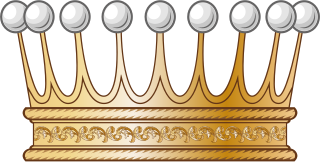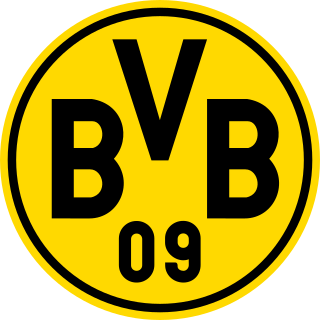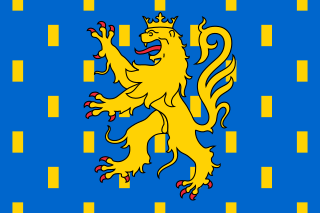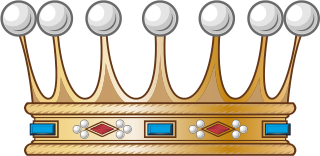Related Research Articles

The Holy Roman Emperor, originally and officially the Emperor of the Romans during the Middle Ages, and also known as the Roman-German Emperor since the early modern period, was the ruler and head of state of the Holy Roman Empire. The title was held in conjunction with the title of king of Italy from the 8th to the 16th century, and, almost without interruption, with the title of king of Germany throughout the 12th to 18th centuries.

Duke is a male title either of a monarch ruling over a duchy, or of a member of royalty, or nobility. As rulers, dukes are ranked below emperors, kings, grand princes, grand dukes, and sovereign princes. As royalty or nobility, they are ranked below princes and grand dukes. The title comes from French duc, itself from the Latin dux, 'leader', a term used in republican Rome to refer to a military commander without an official rank, and later coming to mean the leading military commander of a province. In most countries, the word duchess is the female equivalent.

Fußball-Club Bayern München e. V., commonly known as Bayern Munich or FC Bayern, is a German professional sports club based in Munich, Bavaria. They are best known for their professional men's association football team, who play in the Bundesliga, the top tier of the German football league system. Bayern are the most successful club in German football history, having won a record 33 national titles, including eleven consecutive titles from 2013 to 2023, and a record 20 national cups, along with numerous European honours.
A count palatine, also count of the palace or palsgrave, was originally an official attached to a royal or imperial palace or household and later a nobleman of a rank above that of an ordinary count. The title originated in the Late Roman Empire. In the Middle Ages especially and into modern times, it is associated with the Holy Roman Empire, especially Electoral Palatinate.

Count is a historical title of nobility in certain European countries, varying in relative status, generally of middling rank in the hierarchy of nobility. Especially in earlier medieval periods the term often implied not only a certain status, but also that the count had specific responsibilities or offices. The etymologically related English term "county" denoted the territories associated with some countships, but not all.
Führer is a German word meaning "leader" or "guide". As a political title, it is strongly associated with Adolf Hitler, the dictator of Nazi Germany from 1933 to 1945. Hitler officially styled himself der Führer und Reichskanzler after the death of President Paul von Hindenburg in 1934 and the subsequent merging of the offices of Reichspräsident and Reichskanzler.

The UEFA European Football Championship, less formally the European Championship and informally the Euro or Euros, is the primary association football tournament organised by the Union of European Football Associations (UEFA). The competition is contested by UEFA members' senior men's national teams, determining the continental champion of Europe. It is the second-most watched football tournament in the world after the FIFA World Cup; the Euro 2016 final was watched by a global audience of around 600 million. The competition has been held every four years since 1960, except for 2020, when it was postponed until 2021 due to the COVID-19 pandemic in Europe, but kept the name Euro 2020. Scheduled to be in the even-numbered year between FIFA World Cup tournaments, it was originally called the European Nations' Cup before changing to its current name in 1968. Since 1996, the individual events have been branded as "UEFA Euro [year]".

Graf is a historical title of the German nobility and later also of the Russian nobility, usually translated as "count". Considered to be intermediate among noble ranks, the title is often treated as equivalent to the British title of "earl".

Ballspielverein Borussia 09 e. V. Dortmund, often known simply as Borussia Dortmund or by its initialism BVB, is a German professional sports club based in Dortmund, North Rhine-Westphalia. It is best known for its men's professional football team, which plays in the Bundesliga, the top tier of the German football league system. The club have won eight league championships, five DFB-Pokals, one UEFA Champions League, one Intercontinental Cup, and one UEFA Cup Winners' Cup.

The Free County of Burgundy was a medieval feudal state ruled by a count from 982 to 1678. It was also known as Franche-Comté, from French: franc comte meaning 'free count', and was located in the modern region of Franche-Comté. It bordered the Duchy of Burgundy to the west, which was part of France from 843.

Bayer 04 Leverkusen, officially known as Bayer 04 Leverkusen Fußball GmbH and commonly known as Bayer Leverkusen or simply Leverkusen, is a German professional football club based in Leverkusen, North Rhine-Westphalia. It competes in the Bundesliga, the top tier of German football, and plays its home matches at the BayArena.

Freiherr, Freifrau and Freiin are designations used as titles of nobility in the German-speaking areas of the Holy Roman Empire and in its various successor states, including Austria, Prussia, Bavaria, Liechtenstein, Luxembourg, etc. Traditionally, it denotes the titled rank within the nobility above Ritter (knight) and Edler and below Graf. The title superseded the earlier medieval form, Edelherr.

The DFB-Pokal, also known as the German Cup in English, is a German knockout football cup competition held annually by the German Football Association (DFB). Sixty-four teams participate in the competition, including all clubs from the Bundesliga and the 2. Bundesliga along with the four best teams from the 3. Liga. It is considered the second-most important club title in German football after the Bundesliga championship. Taking place from August until May, the winner qualifies for the DFL-Supercup and the UEFA Europa League unless the winner already qualifies for the UEFA Champions League in the Bundesliga.

The Bundesliga, sometimes referred to as the Fußball-Bundesliga or 1. Bundesliga, is a professional association football league in Germany. At the top of the German football league system, the Bundesliga is Germany's primary football competition. The Bundesliga comprises 18 teams and operates on a system of promotion and relegation with the 2. Bundesliga. Seasons run from August to May. Games are played on Fridays, Saturdays and Sundays, with a focus on Saturdays. All of the Bundesliga clubs take part in the DFB-Pokal cup competition. The winner of the Bundesliga qualifies for the DFL-Supercup.

Burgomaster is the English form of various terms in or derived from Germanic languages for the chief magistrate or executive of a city or town. The name in English was derived from the Dutch burgemeester.

Palatines were the citizens and princes of the Palatinates, Holy Roman States that served as capitals for the Holy Roman Emperor. After the fall of the Holy Roman Empire in 1806, the nationality referred more specifically to residents of the Rhenish Palatinate, known simply as "the Palatinate".

The chancellor of Germany, officially the federal chancellor of the Federal Republic of Germany, is the head of the federal government of Germany, and the commander-in-chief of the German Armed Forces during wartime. The chancellor is the chief executive of the Federal Cabinet and heads the executive branch. The chancellor is elected by the Bundestag on the proposal of the federal president and without debate.

Alexander Zverev is a German professional tennis player and the current world No. 4. He has been ranked by the ATP as high as world No. 2. Zverev's singles career highlights include a gold medal at the 2020 Tokyo Olympics, and titles at the 2018 and the 2021 ATP Finals. He has won 22 ATP Tour titles in singles and two in doubles, and has been runner-up at two majors, the 2020 US Open and 2024 French Open.
References
- ↑ "Freigraf". genealogy.net (in German). Retrieved 2024-08-15.
- ↑ Friesen, Walther; Scheller, Artem (2019). Wappenbuch von Reinhold Schulz (in German). BoD – Books on Demand. ISBN 978-3-7504-7501-4.